
 Flash News
Flash News
Car burns in Belsh-Kuçova, family of five escapes unharmed
Skopje Mayor Attacked in the Face, Urgently Taken to Hospital
Fire in Pogradec, forest massif engulfed by flames
Incident in Theth, Several people throw Molotov cocktails at IKMT's fire trucks
The largest Israeli newspaper writes about the act of the Albanian martyr, Arben Anamali
Albania's anti-disinformation strategy could undermine free media
Parlamenti shqiptar ka miratuar një strategji kombëtare për të luftuar ndërhyrjen e huaj dhe dezinformimin – por opozita pretendon se ajo mund të përdoret kundër mediave vendase që demaskojnë dështimet e qeverisë.
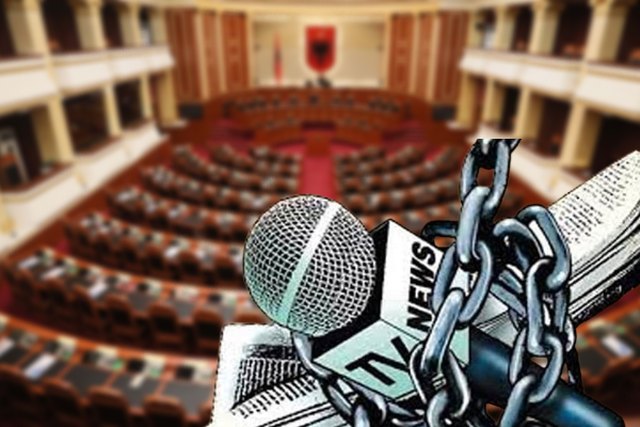
The warning in parliament sounded strong.
“Events have shown that Albania has become a constant target of foreign interference and disinformation, so preventive measures are needed, with the help of our European partners,” Erjon Braçe, an MP from the ruling Socialist Party, told MPs on July 3.
That same day, MPs voted to approve a new National Strategy against Foreign Interference and Disinformation – which aims to combat harmful foreign interference in important sectors such as elections, media and cybersecurity.
During the presentation of the strategy by Brace, who is the chairman of the Special Parliamentary Committee Against Disinformation, he said that the measures are necessary to strengthen national security following cyberattacks in recent years and Albania's commitment to achieving European Union standards.
In 2022, a wave of cyberattacks on Albanian government networks was carried out, according to a report by the US FBI and the Albanian Agency for Cybersecurity and Infrastructure, by hackers working for Iran.
Brace explained that the new strategy is based on four pillars, which include building institutional capacities to prevent foreign interference in election campaigns and protecting national security from such interference, through strengthening partnerships with NATO, the EU and other allies.
They also include protecting Albania's economy and critical sectors within it from financial penetration by bad actors, as well as protecting and strengthening freedom of expression and media freedom by supporting investigative journalism in identifying harmful interference.
According to the strategy, "disinformation, information manipulation, and harmful foreign interference in democratic processes represent hybrid threats that have taken on global proportions over the last decade, undermining trust in fundamental state institutions and the healthy functioning of democratic society."
Specific details on how the strategy will be implemented have not yet been provided, but the Albanian opposition is suspicious of the government's motives.
The opposition argues that under the rule of Prime Minister Edi Rama's Socialist Party, which became even more dominant after its recent victory in parliamentary elections, the strategy could be used to stifle criticism and undermine free media.
The opposition Democratic Party boycotted the work of the Special Committee Against Disinformation and the vote on July 3.
Deputetja Ina Zhupa nga Partia Demokratike, e cila akuzon qeverinë Rama se po përpiqet gjithnjë e më shumë të kontrollojë peizazhin mediatik për të siguruar mbulim miqësor të veprimeve të saj, e quajti strategjinë një “mjet politik”.
“Strategjia e dezinformimit përfundoi ashtu siç filloi, një strategji e njëanshme për t’u përdorur si një mjet politik kundër medias, por edhe për të kapur disi gazetarinë dhe median në Shqipëri”, tha Zhupa për BIRN.
“Nëse e lexoni me kujdes objektivin e katërt që ka të bëjë drejtpërdrejt me median, aty përshkruhet me këto fjalë: së pari, verifikimi i fakteve. Republika e Shqipërisë do të investojë në verifikimin e fakteve, që do të thotë se qeveria shqiptare do të bëjë verifikimin e fakteve dhe do të sponsorizojë start-up-e për të kryer verifikimin e fakteve”, tha ajo.
“Kjo tregon qartë qëllimin për të pasur përfshirje direkte në media, sepse këto start-up-e do të varen nga donatori, domethënë qeveria.”
Elvin Luku, një ekspert i medias që drejton organizatën MediaLook në Tiranë dhe që ka qenë kritik ndaj strategjisë, tha se është e paqartë se si do të zbatohet në praktikë mbështetja e premtuar për gazetarinë investigative.
“Sa i përket mbështetjes për gazetarinë investigative, duket interesante që në pikën 4.1.5 të strategjisë thuhet se do të ofrohen stimuj fiskalë për gazetarinë investigative. Por nuk e kuptoj se si do ta bëjnë këtë në praktikë”, tha Luku për BIRN.
Sipas Zhupës, kjo pjesë e strategjisë ngre edhe më shumë alarme. “Kjo do të thotë se media do të kryejnë hetime me lejen e qeverisë”, argumentoi ajo.
Nevoja për masa mbrojtëse për të shmangur keqpërdorimin
Blerjana Bino, një eksperte e medias që drejton Qendrën për Shkencë dhe Inovacion për Zhvillim në Tiranë dhe organizatën për lirinë e medias Safe Journalists Albania, dhe që mori pjesë në takimet konsultative për strategjinë, argumentoi se nevojiten masa mbrojtëse për të shmangur keqpërdorimin e mundshëm të masave kundër dezinformimit.
“Si pjesë e konsultimeve dhe në takimet e organizuara nga Komisioni i Posaçëm Kundër Dezinformimit, në të cilat morëm pjesë, theksuam nevojën për masa mbrojtëse të qarta për të shmangur keqpërdorimin e mundshëm gjatë zbatimit të planit të veprimit të strategjisë, për shembull për të siguruar që kritikat legjitime ose zërat kundërshtues të mos etiketohen si dezinformim apo ndërhyrje e huaj”, tha ajo për BIRN.
“Strategjia ka disa parime të përgjithshme për rritjen e mbrojtjes kundër manipulimit të informacionit nga ndërhyrja e huaj dhe zbatimi në praktikë duhet të garantojë respektimin e shtetit të së drejtës, lirinë e shprehjes dhe standardet e Këshillit të Evropës për lirinë e shprehjes”, shtoi ajo.
Ajo argumentoi se qeveria duhet të “garantojë që shqetësimet legjitime për sigurinë kombëtare të mos komprometojnë të drejtat themelore të njeriut dhe liritë demokratike”.
Albanian journalists have also expressed concerns about the strategy, particularly because they are already finding it difficult to obtain information from the government and state institutions. Esiona Konomi, a political journalist who covers parliament, argued that the government is currently making no effort to improve transparency.
"On the contrary, while promoting a fight against inaccurate or tendentious information, the media is not being strengthened by being provided with access to information," Konomi told BIRN.
"Disinformation begins first and foremost from a lack of information, and from this perspective, the socialist majority has worsened the situation, being the first source of disinformation," she claimed.
She also stressed that "the package lacks concrete guarantees about who will protect freedom of expression from those who will 'fight disinformation'".
Like many others, Konomi is concerned that the strategy could become a tool in the hands of the government to stifle media coverage it doesn't like.
"As long as there are no independent regulatory institutions or credible self-regulatory institutions in the field of media and information, equipping the government with 'anti-disinformation' packages could easily turn into a weapon of the ruling party to combat critical media that is outside its influence," she argued./BIRN
Latest news


Armed Forces join firefighters in Lura, fire still out of control
2025-07-11 17:32:05
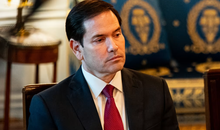
State Department expected to lay off more than 1,300 employees
2025-07-11 17:07:10

Car burns in Belsh-Kuçova, family of five escapes unharmed
2025-07-11 16:51:22
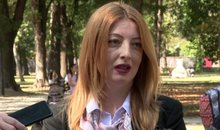
Skopje Mayor Attacked in the Face, Urgently Taken to Hospital
2025-07-11 16:34:15
Health risks from hot nights, how to prevent them
2025-07-11 16:31:30

UN releases figures: At least 798 people have been killed at aid points in Gaza
2025-07-11 16:08:10
Tirana strengthens defense, signs former Aris Thessaloniki player
2025-07-11 16:00:08

Fire in Pogradec, forest massif engulfed by flames
2025-07-11 15:41:58
Incident in Theth, Several people throw Molotov cocktails at IKMT's fire trucks
2025-07-11 15:31:49
30 massage centers and nightclubs closed in Kosovo
2025-07-11 15:23:48

Rama as a curse to his servants!
2025-07-11 15:02:54


From Venezuela to practice prostitution in Vlora, 3 girls under investigation
2025-07-11 14:30:44
High-risk young man arrested in Fushë Kuqe (NAME)
2025-07-11 14:17:52
Iranian Nobel Peace Prize winner receives death threats from Tehran
2025-07-11 14:08:57
Seven victims buried on 30th anniversary of Srebrenica genocide
2025-07-11 13:58:04
Dinners after 8:00 PM harm the body and sleep, what the study shows
2025-07-11 13:56:27

The question is not "how many there are", but who are the "advisors"...?
2025-07-11 13:40:09

Gramsh/ Landslide, 58-year-old dies
2025-07-11 13:27:31
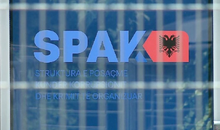
Anti-drug action in Shkodra, who is the former police officer wanted by SPAK
2025-07-11 13:11:40
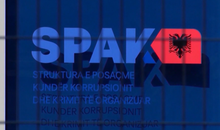
SPAK action in Shkodra, 13 arrest warrants issued, including police officers
2025-07-11 12:53:55
Requests freedom, date set for review of Meta's appeal
2025-07-11 12:42:40
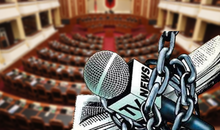
Albania's anti-disinformation strategy could undermine free media
2025-07-11 12:26:14


Dervish's Irony: Why are 30 advisors few for a water supply director?
2025-07-11 11:58:20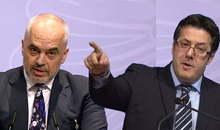


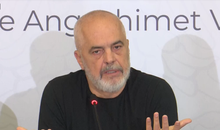
Rama's ultimatum: On Monday, all heads of administrative units must be dismissed
2025-07-11 11:05:59
Fires in the country, 4 fires still active, what is the situation?
2025-07-11 10:56:23
Government irony: Rama strips Dredha of power, then demands law and order
2025-07-11 10:49:10
German media: Vlora Airport 'kills' one of Europe's largest wetlands!
2025-07-11 10:37:46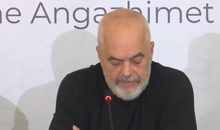

Amid the Alps in Theth, the law punishes even those who try to respect it
2025-07-11 10:14:16
Wanted for theft, 26-year-old arrested in Durrës
2025-07-11 10:03:29
After the dismissals, Rama gathers the mayors in Durrës
2025-07-11 09:42:29
Released on bail, Salianji appears before the Probation Service
2025-07-11 09:34:28

Haxhi Qamil Rama and the directors of the Municipalities!
2025-07-11 09:21:35
30 years since the Srebrenica massacre in Bosnia and Herzegovina
2025-07-11 09:10:52

From rhetoric to brandy, POLITICO: 9 things Nigel Farage can do in Albania
2025-07-11 08:53:35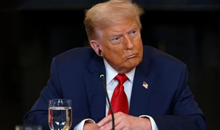
Trump announces 35% tariffs on Canadian goods
2025-07-11 08:39:29
Foreign exchange, how much foreign currencies are sold and bought today
2025-07-11 08:24:25

Horoscope, what do the stars have in store for you today?
2025-07-11 07:59:39
Sun and high temperatures, weather forecast
2025-07-11 07:41:09
Morning Post/ In 2 lines: What mattered yesterday in Albania
2025-07-11 07:20:14
Zhupa: In Theth, some Austrian strategic investors want the empty area
2025-07-10 22:57:08
Malltezi: SPAK admits, we are in a process that began with Balla's false report
2025-07-10 22:34:16

Si të çliroheni nga bllokimet emocionale me anë të ushtrimeve
2025-07-10 21:57:24

Lala: Veliaj wanted to return as mayor
2025-07-10 21:40:46

VIDEO/ Brawl in Bolivian parliament, deputies physically clash
2025-07-10 21:20:30


Albania experienced one of the longest heat waves of the last decade
2025-07-10 21:01:09

The Government approves new procedures for declaring residence in e-Albania
2025-07-10 20:39:32

Koka: Northerners will not forget Edi Rama's racist operation in Theth
2025-07-10 20:18:24
The 3 zodiac signs that will be most affected by the 'Full Moon' of July 10
2025-07-10 20:04:49
New director of the National Center of Cinematography appointed
2025-07-10 19:51:12
Korça/ 40-year-old man jumps from fifth floor balcony, in critical condition
2025-07-10 19:40:19
'Tired Woman'/ The Syndrome That Affects Thousands of Women Every Day
2025-07-10 19:34:02
Jane Birkin's original Hermès bag sells for $10 million
2025-07-10 19:26:22

Britain-Ukraine agreement signed for 5,000 Thales missiles
2025-07-10 19:00:25
Fire in Zvërnec, flames endanger two hotels
2025-07-10 18:57:19
Croatia restores compulsory military service
2025-07-10 18:39:01
Spahia: The great truth of the strong accusation of the residents of Theth
2025-07-10 18:35:07


The Supreme Court left him in prison, Meta addresses the 'Constitution'
2025-07-10 17:57:21
New punishment with 'new' regulations
2025-07-10 17:54:46
EU translator fired over fears for Zelenskyy's safety
2025-07-10 17:45:37
'You are a policeman, but not God, take my soul', protest for Agon Zejnullahu
2025-07-10 17:41:21


Video/ Rama repeats the scenario, kneels before Meloni again
2025-07-10 16:56:31
He set fire to a plot of olive trees, 50-year-old man arrested in Shijak
2025-07-10 16:46:19

Rubio: US and Russia have exchanged new ideas for Ukraine peace talks
2025-07-10 16:36:20
